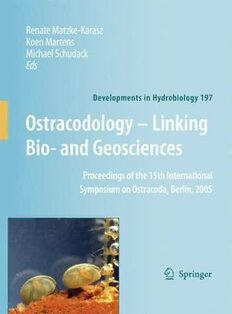
Ostracodology - Linking Bio- and Geosciences: Proceedings of the 15th International Symposium on Ostracoda, Berlin, 2005 (Developments in Hydrobiology) (Developments in Hydrobiology) PDF
269 Pages·2007·12.74 MB·English
Most books are stored in the elastic cloud where traffic is expensive. For this reason, we have a limit on daily download.
Preview Ostracodology - Linking Bio- and Geosciences: Proceedings of the 15th International Symposium on Ostracoda, Berlin, 2005 (Developments in Hydrobiology) (Developments in Hydrobiology)
Description:
Ostracods, small aquatic Crustacea, occur in almost every marine, brackish and freshwater habitat. Their calcified bivalved carapaces readily fossilize and their record in earth history is long, dense and diverse. Ostracod species are particularly useful as tools in marine and limnic (palaeo-) ecology, in (palaeo-) biogeography, and biostratigraphy. Their reproductive morphology is as extraordinary as their reproductive modes, and many of their physiological peculiarities remain mysterious. Ostracod taxonomy and phylogeny contribute to general studies of crustacean evolution. The diversity of ostracod applications in both biology and palaeontology is clearly illustrated by the eighteen papers of the 15th International Symposium on Ostracoda (Berlin, Germany) in 2005, which are grouped in the present proceedings, one of three volumes resulting from this meeting.
See more
The list of books you might like
Most books are stored in the elastic cloud where traffic is expensive. For this reason, we have a limit on daily download.
